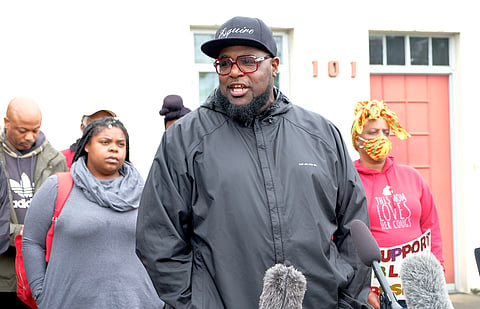Surprise Announcement That City Will Transfer Fire Station to Community Leaves Many Questions Unanswered
by Erica C. Barnett
Last Friday, Seattle's Department of Neighborhoods made an announcement on its blog that came as a surprise even to its beneficiaries: After years of inaction, the city would finally transfer control of the decommissioned Fire Station 6 in the Central District to the Africatown Community Land Trust for redevelopment into the William Grose Center for Enterprise and Cultural Innovation, a long-planned incubator for Black-owned businesses. The development could include meeting rooms, technology labs, and maker spaces, along with up to 20 units of housing for young adults.
"There's very few spaces that we walk into as African-Americans where we know we're loved," said Seaspot Media CEO Chukundi Salisbury, a Democratic candidate for 37th District state representative and advocate for the Grose Center project. "Walking into the Liberty Bank building," an affordable-housing development built through a partnership between Africatown and Capitol Hill Housing, "I feel loved, and I feel welcome, and that in itself is an achievement — just to walk in and not feel out of place, to feel that this place is for me."
Eventually, the Grose Center could be one of those places. For now, though, the groups who have spent five years pushing the city to hand over the disused property are still waiting for the keys.
"We were surprised by the announcement," Africatown executive director K. Wyking Garrett said during a press conference outside the fire station Monday. "We found out via social media, like many others, but we're encouraged and think it's a step in the right direction toward the overall goals of the King County Equity Now Coalition." The fire station was one of several properties identified as future sites for Black-run enterprises by the King County Equity Now Coalition, which includes Africatown, the Black Community Impact Alliance, Black Dot, and other community groups.
The city's announcement came after weeks of negative headlines for Mayor Jenny Durkan and Police Chief Carmen Best, who have been criticized for using force against mostly peaceful protesters on Capitol Hill, and one week after thousands of people rallied in front of the fire station in support of King County Equity Now's demands. The department and mayor have resisted calls to make larger, more systemic changes demanded by protesters, chief among them defunding the police, redirecting funds to Black-led, community-based organizations, and releasing people arrested during demonstrations against police violence.
Organizers of Monday's press conference said they wished they could bring reporters inside the vacant building to see the space, but they currently have no way to get inside. Nor has the city proposed a funding plan for upgrades to the building or begun to work on the zoning changes that will be necessary to convert the property into a community center with on-site housing
Asked what concrete steps the city has taken, other than last week's announcement, a spokeswoman for the mayor's office said, "Over the past two weeks, Mayor Durkan and City leaders have met with dozens of black community leaders representing a broad range of interests, including transferring city, county and state properties to community-based organizations. Mayor Durkan supports these efforts. After meeting with groups last week, [deputy mayor Shefali] Ranganathan committed to working with community stakeholders … to move forward on next steps and the process for the transfer of FS6. The City looks forward to creating another strong community partnership to carry this project forward."
Africatown board member Isaac Joy noted Monday that Durkan is "getting a lot of pressure right now to address racial inequity in Seattle. … I don't want to give her too much praise, because it shouldn't take much organizing, it shouldn't take thousands of Black people being in the streets, endangering themselves in the middle of the pandemic, to get the mayor to transfer over property that has been sitting vacant," Joy said.
Funding for the redevelopment would come, in part, from the city's Equitable Development Initiative, which was created five years ago to support community-led development in areas with a high risk of economic displacement, like Rainier Beach and the Central District. The Grose Center was one of the first five projects identified in that process, but like others, including the Rainier Valley Food Innovation District, it has not moved much beyond the planning stages.
The Grose Center is named after William Grose, a Black businessman who purchased 12 acres of land from Henry Yesler in 1882 that eventually became the heart of the Central District. Garrett said Monday that the building would not be part of a "historic district," but would serve as a "living memorial that will pay honor to the past" while creating opportunities for the Black entrepreneurs and innovators of the future. "We anticipate this being on an accelerated timeline, and we will continue to press for that, to ensure that we get the key, we get the title, and that we move forward on this project," Garrett said.
Erica C. Barnett has covered Seattle politics since 2001 for print and online media. Read her latest at The C Is for Crank.
Featured image: Chukundi Salisbury speaks during Friday's press conference (Photo: Erica C Barnett)
Help keep BIPOC-led, community-powered journalism free — become a Rainmaker today.


